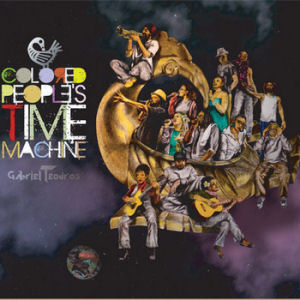Gabriel Teodros hails from the 98118, which his bio proudly proclaims is “the most ethnically diverse zip code in the country.” That seems like unnecessary hyperbole given it has absolutely no bearing on whether or not he’s a good lyricist or musician, but dutiful fact checker that I am, I decided to look it up anyway. There appears to be some census data that supports the claim, but the anecdotal accounts from Columbia City (annexed into the city of Seattle back in 1907) also suggests that urban gentrification is in full swing. This is due to the skyrocketing value of real estate in what is seen as a hip and trendy Seattle neighborhood that caters to the eco friendly – plenty of bike paths and easily available mass transit options. For what it’s worth said same anecdotal evidence highly rates the diversity of ethnic restaurants and rates Rainier Avenue as a top tourist destination.
It is in this environment that Teodros released the album “lovework” in 2007. DJ Complejo’s review was generally positive, although it did subtly hint that Teodros was a bit of an activist, borderline to being a man out of time from a 1960’s era of flower power, love and peace. Perhaps that’s true. It may be that Teodros travelled here in his TARDIS style “Colored People’s Time Machine,” saw the grim negativity of the 21st century, and committed himself to making a difference with his positive vibes. “Time Machine” is a rap album most parents wouldn’t need to worry about their children listening to – unless they’re worried about the sorrows of the real world being too deep for a young mind. “Saturn’s Return” is a self-confessed true story that floats lovely over piano keys:
“I never thought I’d see 21
Late 20’s, feel like my life’s just begun
Although I almost ended it
when I hit 27 – musicians in heaven know
Sometimes feel like I’m walkin Jimi’s road
See I was low, feeling all alone
Even though there’s so many dreams I now
have fully actualized, it came with sacrifice
Went without a house, more than a couple times
From Seattle, Brooklyn, Vancouver, to where-
-ever these rhymes take a cat
See it was worth the time passed, but I still don’t unpack
my rooms and boxes like I’m bouts to move out
It’s not that I’m fin’ to bounce, just that home is not a house
and it never was…”
As troubled as Teodros was by his hardships, he still found that “change is constant, there is no end” and took comfort in that and writing raps with his pen. He even claims that he “had to be broken to pieces so I could be open to grow into who I’m supposed to.” If that’s a hippie state of mind, it’s a pretty philosophically evolved one. Listening to Teodros one gets a feeling he’s a student of life, searching for meaning beyond the basic carnal concerns that predominate much of today’s popular rap music. To put it succinctly, he’s not a “bling bling” rapper, a “trapper” or looking to guzzle bottle of bottle of liquor until his liver fails or diabetes sets in. Calling him spiritual might be overstating it, but “Babylon By Bus” is at least proof that he’s an observer of the human condition:
“If Babylon is a tower, then it lays on its side
It’s not about height, the walls shine bright
You could go outside and not see that it’s night
A city that’s designed for you to lose track of time
I know it by bus, not book or imagination
Oasis in a wasteland, tourist destination
Manmade hell, alias Las Vegas
The city of false promise, jobs and lost wages
Where enough food is wasted every night to feed a country
And everyone’s connected to someone runnin from somethin”
His description of the city rings true from personal experience when he raps “the neon lights make the sky turn green/and every corner store got a row of slot machines.” Teodros could be this insightful and observant and go completely unnoticed in a consumerist culture that would rather embrace the excesses of Sin City than turn an eagle eye on it – particularly if his beats were the least bit suspect. The angelic harmonies Dead Noise back this song with make Teodros’ verbals that much more powerful though. Even if the diversity of his community is overrated, the diversity of producers working with him on this album is not. The soulful groove Bean One gives “Blossoms of Fire” is on point.
Phreewil jingles bells for Teodros and his guest Madlines the Lioness on “Flow Throo.” JustD’amato strikes a whimsical and addictive note reminiscent of a J Swift beat for The Pharcyde on “Sun & Breeze.” Amos Miller turns folk funky on “Still With You.”
Mistakes are very few and far between on “Colored People’s Time Machine,” an album that shows genuine thoughtfulness in almost every aspect of its production and creation. These are beats and rhymes deliberately considered for how well they would serve each other working together. Teodros does to some degree strike an observer as a West coast modern day hippie, down to his rakishly tilted hat and quasi-homeless style beard, but much like the ethnicity of Columbia City there’s far more going on than what can be seen by the naked eye alone. Good albums are more than just pleasant slices of time to listen to – they create genuine moods that change how you feel while listening. Just like a great M.O.P. album can make you feel amped and energetic, Gabriel Teodros can make you feel calm and mellow. His raps are like a cool breeze on a sunny day, but don’t mistake him for soft and lazy in any way. It’s hard work being this damn cool.

